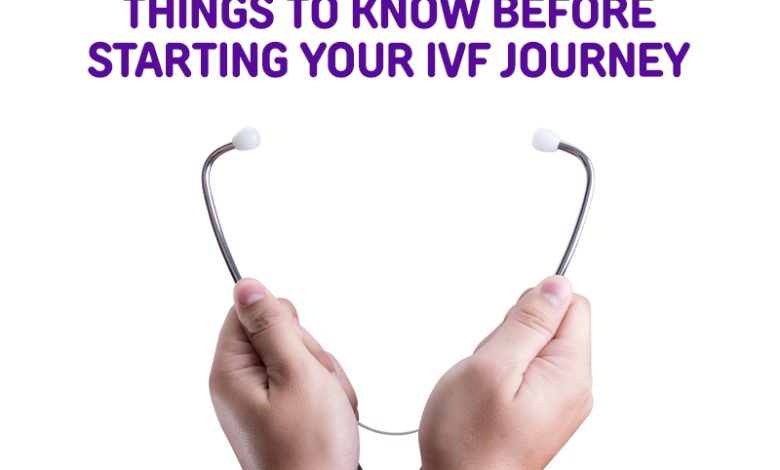
IVF Treatment: Many couples face challenges in conceiving because of infertility problems. If a couple’s attempts to get pregnant over a year fail, they are classified infertile. For a married couple holding out hope to start a family, infertility can be saddening. However, procedures like in vitro fertilization IVF have been a ray of hope for innumerable infertile couples.
If you are planning to go for an IVF process, you need to know why you need an IVF, understand the process, important things to consider before you start with IVF and lifestyle habits that can improve your chances of successful IVF treatment.
Without further ado, let’s get started and put an effort to increase your odds of a successful IVF journey.
Why Do You Need an IVF Treatment?
When blocked fallopian tubes or male factor fertility are reasons behind infertility, you need an IVF treatment. Moreover, the age of women and the years of being infertile can also be the determining factor behind getting an IVF.
IVF Process – Understanding Every Step of the Treatment
Knowing the IVF procedure is the very first part of preparing your mind and body for the impending treatment. The IVF procedure refers to fertilising eggs in a laboratory environment and then transferring the embryos into the uterus of the mother.
Each stage of IVF treatment can make you feel anxious or sensitive. Nevertheless, the more you apprehend each step, the better mentally and physically prepared you will be.
Here are stages of the treatment that you should know:
Consultation and Testing
When your IVF cycle starts, your doctor will ask you to go through some pre-treatment tests. Some medical tests are made compulsory by state or federal law, and some as consulted by the doctor. Generally, the tests you need to undergo are ultrasound, semen analysis for the male partner, blood work etc.
Ovarian Stimulation
Women can prepare for egg retrieval and raise the odds of conceiving by using fertility medications. Ovarian stimulation is an essential aspect of egg production. With hormonal injections, oral and injectable fertility medicines are advised for better results. Such medications stimulate the ovaries to create eggs. The matured eggs can be retrieved then using a transvaginal ultrasound.
Egg Retrieval
Patients will be given general anaesthesia once the eggs get matured and are ready for retrieval. Thereafter, the eggs are retrieved by injecting a needle via the vaginal wall and into the ovary. The eggs are absorbed from developing follicles and then collected into test tubes.
Fertilization
Once in the lab, the eggs are observed under a microscope and prepared for fertilisation with either fresh or frozen sperm in the laboratory. After that, a procedure known as ICSI (Intracytoplasmic Sperm Injection) is used to infuse one healthy sperm with each workable egg.
Embryo transfer
The eggs are fertilized with sperm, and the generated embryo will be either implanted into the uterus directly or kept frozen for after usage. Embryo transfer is a simplistic, pain-free process undertaken without anaesthesia under ultrasound guidance.
A single cycle of the IVF process takes around two weeks; and depending on your age or reproductive health, you may need more than one cycle to carry a pregnancy.
Things You Do Before You Embark on Your IVF Journey:
Around 10-14% of the Indian population faces infertility, according to the Indian Society of Assisted Reproduction. So, there’s no doubt that IVF treatment is the most preferred route to achieve the joy of parenthood.
If you are planning to go for IVF, here are some things to keep in mind before you begin with your IVF journey:
Stay Positive
As a couple, you need to have a positive mind set and cling to the goal until you succeed in carrying a pregnancy. To achieve the goal, the couple must think that it is possible and always keep alternatives available. Maintain your optimism and confidence throughout your specific IVF journeys, but bear in mind that factors such as age, weight, lifestyle habits, and overall health will determine your chances of success.
Understand the Process
First and foremost, research appropriate websites to learn about infertility treatment and what is expected of you. Infertility treatment does not always entail IVF. It is decided whether to do Intrauterine Insemination (IUI), IVF, or ICSI treatment based on the male and female fertility assessments. Patients have a 10-15% chance of successfully conceiving with IUI, which is a much cheaper alternative.
Choose an Honest and Trustworthy IVF Centre
No matter what, you have to choose an honest and ethical IVF centre to achieve success in the IVF process. You will invest your valuable time, money and physical and mental health into the IVF process, so the IVF clinic you choose should be a highly reliable one. IVF centres like Banker IVF are trustworthy and offer the best infertility and IVF treatment using cutting-edge technology, bringing you a step closer to becoming a parent.
Assess Your Lifestyle
Keeping a healthy weight is an essential aspect of fertility. Take a balanced diet and ensure including foods that improve the ability to conceive in men and women. Exercise regularly or become physically engaged to ensure an active lifestyle. Overall, make some changes in your diet and adopt a healthier lifestyle.
Trust the Process and Give Some Time
After making up your mind to take the IVF option, trust your doctor and cooperate with the doctor and team for the IVF success. You and your partner need to be religiously committed to the process and strictly follow the treatment schedule. The process may take some time, but you do not have to lose hope.
Some Lifestyle Tips for IVF Treatment:
Sleep Well
Lack of sleep could be one of the major reasons behind imbalanced hormones. Hormonal imbalance can lead to weight gain and fatigue, reducing your likelihood of becoming pregnant. When preparing for IVF, ensure that you have a sound sleep for good hours so that there is no bad effect on your IVF results. If you have trouble sleeping, try meditation.
Don’t Smoke or Drink
You and your partner should strictly say no to smoking and drinking. While you smoke or drink, the quality of your eggs may have a negative impact, which may lower down your possibility of IVF success. Overall, smoking and drinking can harm egg development and impact sperm quality.
Balance your diet
While you are preparing for IVF treatment, the first and foremost thing you need to do is develop healthy eating habits to ensure that your sperm and egg maintain optimum health. Ensure adding some of the below-stated foods in your diet to improve your fertility:
- Eat maximum fruits and vegetables
- Shift to low-fat dairy products
- Eat foods high in water content such as watermelon.
- Take proteins like fish and poultry
- Do not eat highly processed foods, sugar, refined grains or red meat
- Eat whole-grain pasta
Maintain a Healthy Weight
If you are about to start your IVF journey, keep a close watch on your weight. Your ability to become pregnant can reduce extensively if you are obese or underweight. The success rate for the IVF process may be lower if your BMI is over 30 or under 19. Being overweight can make it tricky for your fertility specialists to monitor ovaries, and being underweight can make it tough for your hormones to produce mature eggs.
Take Multivitamins
When trying to conceive, multivitamins are frequently recommended. Including multivitamins in your diet lowers the risk of congenital disabilities. These supplements are appropriate for women undergoing IVF procedures.
Get a Health Check-up
Get your tests for diabetes, high blood pressure, or infectious diseases that can interfere with your ability to conceive a child. Furthermore, both parents must undergo fertility health checks to determine the causes of underlying issues.




